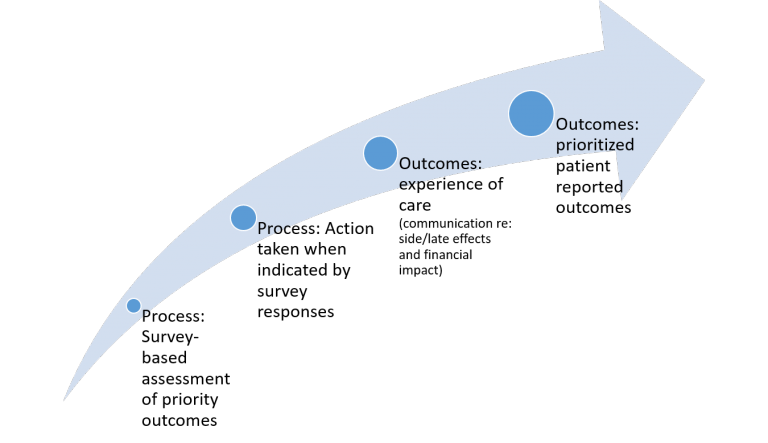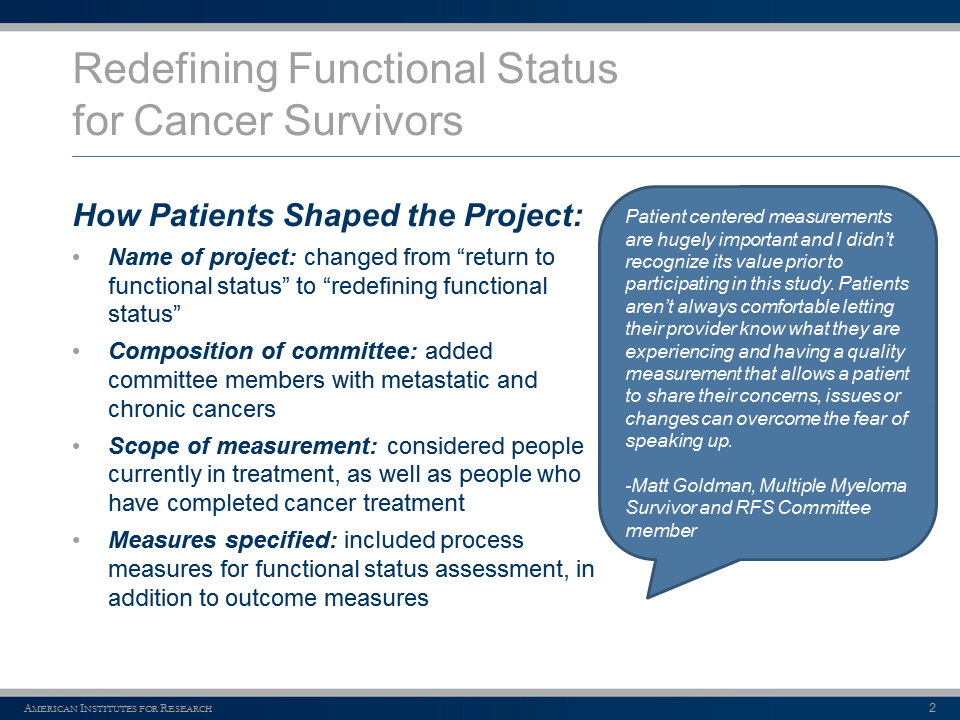NCCS is now Cancer Nation. Find out more about our next chapter. Join Us
Redefining Functional Status: A Patient-Led Quality Measurement Effort
Background
In 2018 the National Coalition for Cancer Survivorship (NCCS) was awarded a grant from the American Institutes for Research (AIR), with support from the Robert Wood Johnson Foundation, to lead a group of cancer survivors in defining a new quality measure concept to represent cancer survivors’ ability to return to functional status (RFS) following cancer treatment. NCCS assembled a committee of experienced patient advocates who represent diverse cancer experiences and types of cancer to define quality measures that are meaningful to survivors. Using a novel project design to develop a conceptual definition of functional status, during and after cancer treatment, NCCS was the only patient advocacy organization selected in a highly competitive selection process.
View/Download the full-length RedefiningFunctional Status (RFS) Project Overview [PDF] »
High-Level Project Steps
- Convened diverse committee of 10 cancer survivors, as well as Technical Expert Panel (TEP).
- Solicited input from cancer survivors through various social media platforms.
- Developed conceptual definition of “redefining functional status” through structured RAND Delphi methodology.
- Evaluated existing validated survey instruments for alignment with the conceptual definition and selected surveys.
- Developed patient-centered specifications for RFS process and outcome measures (PRO-PMs).
“Patient-centered measurements are hugely important and I didn’t recognize its value prior to participating in this study. Patients aren’t always comfortable letting their provider know what they are experiencing and having a quality measurement that allows a patient to share their concerns, issues or changes can overcome the fear of speaking up.”
– Matt Goldman, Multiple Myeloma Survivor and RFS Committee Member
RFS Committee: (L to R) Dan Weber, Allen Hirsch, Kristen McNiff, Shelley Fuld Nasso, Kirby Lewis, Allison Rosen, Candace Henley, Rebecca Esparza, Desiree Walker, Kelsey Nepote, Matt Goldman, Betsy Glosik, and Susan Strong
In this webinar, you will:
- Learn how cancer survivors defined the concept of “redefining functional status” and how to measure it;
- Hear from project co-leads Shelley Fuld Nasso (NCCS) and Kristen McNiff (KM Healthcare Consulting), as well as survivor committee members, about the project methodology, findings, and lessons learned;
- Understand the value in patient advocacy organizations taking a leading role in quality measurement development.
Webinar – RFS Project Summary Webinar
“Learn how cancer survivors defined the concept of “redefining functional status” and how to measure it. Project leaders and committee members discuss the methodology, findings, and lessons learned.”
Together, we hope to leverage this project to shape quality measurement and ensure cancer survivors live well during and after cancer treatment.
Key Findings
Patient leadership resulted in challenges to common jargon, because the words we use matter in defining quality. Early in the project, committee members concluded that “return to functional status,” the initial label for the project, did not resonate with them. Ultimately, the group felt that “functional status” was important and conveyed something different and more specific than a general term like “quality of life.” They did not like the idea of “returning” to something because the reality of cancer is that life is never the same after a cancer diagnosis.
The committee decided on “redefining,” because it acknowledges that patients and the health care team have an active role in determining functional status after a cancer diagnosis. This small but important change indicates active engagement during the cancer trajectory to prepare patients for changes and in managing functional status impacts.
The Delphi methodology resulted in the following prioritized patient reported outcome measurement domains:
- Global quality of life (including overall physical and mental health)
- Physical function
- Pain
- Fatigue
- Cognitive function
- Psychosocial illness impact (including emotional problems, depression, independence, sense of control, and resilience).
Further, one of the project’s main consensus recommendations was a core requirement that cancer providers conduct routine functional status assessment (including, at minimum, the prioritized domains) to help those with cancer to redefine functional status during treatment and survivorship. Unfortunately, the RFS Committee consensus and published literature indicate that standard assessment of these domains is the exception, rather than the norm, in cancer care today. As such, we added a group of process measures regarding routine assessment of these domains via validated survey instruments into the RFS measure set. The process measures will help enumerate the current performance gap and highlight initial opportunities for improvement.
The committee also concluded that an RFS measure set must evaluate providers’ reaction to any poor or concerning patient responses to any administered survey. Thus, the final measure set also includes a group of process measures regarding provider action taken, as needed.
Finally, the committee prioritized inclusion of measures regarding side effects and late effects of cancer treatment, as well as the financial impacts of cancer. Group evaluation of these domains revealed that measurement is best focused on the quality of provider communications and information sharing. Thus, the RFS set includes indicator statements regarding patient experience outcomes in these domains. Survey development and testing may be required in these areas to allow for full performance measure development.

Acknowledgements
The NCCS project was led by Shelley Fuld Nasso (NCCS) and Kristin McNiff (KM Healthcare Consulting), with support from Elizabeth Goss and Kelsey Nepote. NCCS gratefully acknowledges the members of the RFS Committee – Rebecca Esparza, Betsy Glosik, Matt Goldman, Candace Henley, Allen Hirsch, Kirby Lewis, Allison Rosen, Susan Strong, Desiree Walker, and Dan Weber – for their guidance, patience, time, commitment, and passion.
NCCS is deeply grateful to the American Institutes for Research, with support from the Robert Wood Johnson Foundation, for making the Patient-Centered Measurement Pilots Projects possible and to the other pilot projects for sharing their experience and learnings.
“Patient-centered measurements are hugely important and I didn’t recognize its value prior to participating in this study. Patients aren’t always comfortable letting their provider know what they are experiencing and having a quality measurement that allows a patient to share their concerns, issues or changes can overcome the fear of speaking up.”
– Matt Goldman, Multiple Myeloma Survivor and RFS Committee Member
“This project has allowed me to step back and look at the larger impact of disease and treatment beyond my own experience. Every individual is unique and affected differently when faced with diagnosis and treatment options. One size, one measure does not fit all patients.”
– Allen Hirsch, Head & Neck Cancer Survivor and RFS Committee Member


